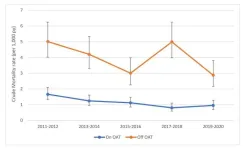(Press-News.org) Planning policies to restrict the number of new fast-food outlets leads to fewer overweight and obese children according to research led by Lancaster University.
Researchers examined the impact of policy in the North East of England where Gateshead Council prevented any existing non-fast-food commercial property from being converted into a hot fast-food takeaway.
The lead authors of the study, published in the journal Obesity, are Dr Huasheng Xiang from Lancaster University Management School and Professor of Health Inequalities Heather Brown from the Faculty of Health and Medicine at Lancaster University.
The researchers used Government collected data that included: children’s weight from the National Child Measurement Programme, Food Hygiene Ratings from the Food Standards Agency, and deprivation and population measures from the Office of National Statistics.
They also assessed Gateshead neighbourhoods with comparable areas across the North East. Across the whole borough they found no significant change in childhood overweight and obesity between Gateshead and the areas of comparison.
However, when they looked at neighbourhood deprivation, they found that, in those areas with the highest proportion of fast-food outlets, the Gateshead neighbourhoods were associated with a statistically significant reduction in the prevalence of childhood overweight and obesity in comparison with corresponding neighbourhoods in the North East.
In sub-group analysis by area level deprivation, they found that those quintiles of deprivation within Gateshead with the highest proportion of fast-food outlets had a statistically significant reduction of 4.80% in the prevalence of childhood overweight and obesity in comparison to comparable neighbourhoods in the North East.
Professor Brown said: “Given that a majority of local authorities in England have implemented planning policies that target hot food takeaways, if these are like Gateshead’s and are suitably robust and restrictive, it is possible that they could contribute to our efforts to reduce childhood overweight and obesity. Furthermore, given that such food establishments are found in greater density in more deprived communities, such policies may help reduce health inequalities.”
Alice Wiseman, Director of Public Health at Gateshead Council and Newcastle Council, said: “Creating environments which support access to healthy affordable food is one of the biggest public health missions of our generation.
“The challenge of healthy weight and access to nutritious food is complex, ever changing, and hard to resolve. There is no silver bullet, and several interventions are needed to create real, impactful, and lasting change.
“It’s great to see, when teams across local government come together with full institutional support, how robust planning policies can chip away at such challenges to facilitate healthier and more resilient communities.”
The other researchers included Dr Louis Goffe, HDRC Gateshead Council, Dr Viviana Albani, Newcastle University and Professor Amelia Lake and Dr Nasima Akhter from Teesside University.
The study was funded by the National Institute for Health and Social Care Research (NIHR) Applied Research Collaboration North East and North Cumbria (NIHR200173).
END
How limiting new fast-food outlets may reduce childhood obesity
2024-10-23
ELSE PRESS RELEASES FROM THIS DATE:
Sleep experts call for UK to abolish twice-yearly clock changes
2024-10-23
A team of leading sleep researchers from the British Sleep Society have called for the government to abolish the twice-yearly clock changes in the UK due to the adverse effects on sleep and circadian health.
After considering the available scientific evidence that circadian and sleep health are positively affected by the availability of natural daylight during the morning and negatively affected by the twice-yearly changes of clock time, especially when the clocks move forward in spring, the British Sleep Society recommends the abolition of the twice-yearly clock changes in the UK.
With sleep being central to health and wellbeing, the Society has issued a statement ...
Risk of cardiovascular disease linked to long-term exposure to arsenic in community water supplies
2024-10-23
Long term exposure to arsenic in water may increase cardiovascular disease and especially heart disease risk even at exposure levels below the federal regulatory limit (10µg/L) according to a new study at Columbia University Mailman School of Public Health. This is the first study to describe exposure-response relationships at concentrations below the current regulatory limit and substantiates that prolonged exposure to arsenic in water contributes to the development of ischemic heart disease.
The researchers ...
Taking the “vibrational fingerprints” of molecules got 100 times faster
2024-10-23
Researchers Takuma Nakamura, Kazuki Hashimoto, and Takuro Ideguchi of the Institute for Photon Science and Technology at the University of Tokyo have increased by a 100-fold the measurement rate of Raman spectroscopy, a common technique for measuring the “vibrational fingerprint” of molecules in order to identify them. As the measurement rate has been a major limiting factor, this improvement contributes to advancements in many fields that rely on identifying molecules and cells, such as biomedical diagnostics and material analytics. The findings were published in the journal Ultrafast ...
Gardens prevent pollinators from starving when farmland nectar is scarce, new study finds
2024-10-23
Gardens offer a steady and reliable source of nectar all year round, helping to keep pollinators fed when farmland sources are limited, researchers have discovered.
This consistency means that even small patches of gardens in rural areas can sustain pollinators, particularly in early spring and late summer when nectar is scarce.
In the findings, published today in Proceedings of the Royal Society B, scientists at the University of Bristol discovered that gardens can provide between 50% and 95% of the total nectar during these critical ...
Addiction treatment decreases suicide risk among people with opioid dependence
2024-10-23
Treating opioid use disorder significantly lowers the very high rate (8 times the general population) of suicide among people with opioid dependence.
A Scottish study led by Glasgow Caledonian University of over 45,000 patients receiving methadone or buprenorphine for opioid use disorder reported this important result today in the scientific journal Addiction.
There were 575 suicides among the group of 46,453 people with opioid use disorder, accounting for 1.2% of the group. Although every member of the group received an OAT prescription at some point between 2011 and 2020, some ...
Abundant urban green space linked to lower rates of heat related illness and death
2024-10-22
Abundant green space in urban areas is linked to lower rates of heat related illness and death as well as better mental health and wellbeing, finds a systematic review of the available research, published in the open access journal BMJ Open.
Green space may help offset the adverse health effects of high temperatures, conclude the researchers.
In recognition of the detrimental heat related effects of increasing urbanisation and climate change, one of the UN Sustainable Development Goal targets stipulates the ...
Lifetime sudden cardiac death risk 4+ times higher for those with schizophrenia
2024-10-22
The lifetime risk of an unexpected and sudden death from a cardiovascular cause in the absence of pre-existing heart disease—known as sudden cardiac death—is more than 4 times higher for people with schizophrenia than it is for the general population, indicates Danish research published online in the journal Heart.
The risk is still around twice as high for those with other types of mental ill health, such as depression, whatever their age, indicate the findings, which suggest that an 18 year old can expect to live around 10 fewer years than someone of the same age without mental health issues.
The research to date indicates ...
Scurvy may be re-emerging amid cost of living crisis and rise of weight loss surgery
2024-10-22
The scourge of scurvy, which is caused by vitamin C deficiency, may be re-emerging amid the cost of living crisis and the rise in weight loss (bariatric) surgery, suggest doctors in the journal BMJ Case Reports after treating a middle-aged man with the condition.
Scurvy is eminently treatable, but because it’s a disease of the past, first associated with sailors during the Renaissance era, it may be mistaken for other conditions, especially inflamed blood vessels (vasculitis), potentially risking fatal bleeding if left untreated, highlight the authors.
Signs can appear as early as a month after a daily intake ...
Ethical framework aims to counter risks of geoengineering research
2024-10-22
WASHINGTON — As interest grows in geoengineering as a strategy for tackling global warming, the world’s largest association of Earth and space scientists today launched an ethical framework as a guide to responsible decision-making and inclusive dialogue.
The report, facilitated by the American Geophysical Union (AGU) and advised by a global panel of experts, says any research into large-scale interventions in Earth’s climate system must be grounded in sound ethical principles so society can make informed choices about whether to deploy them. It warns that the unintended consequences ...
New AI tool set to be a “game changer” in improving outcome predictions for kidney transplant patients
2024-10-22
A new advanced artificial intelligence (AI) tool, developed by renal doctors internationally, represents a significant step forward in predicting and potentially improving outcomes for UK kidney transplant patients.
For patients with late-stage renal failure, a kidney transplant can be life-changing, offering the promise of improved survival and a better quality of life compared to other treatment options. But in the UK alone, around 5,000 people are on the waiting list for a kidney transplant, ...



